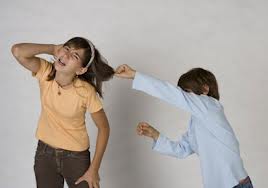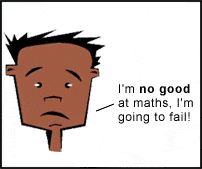Kids and behavioural problems

t is important to remember that kids cannot always name their emotions and tell us why they are feeling the way they do thus their emotions are expressed through their behaviour.
Also remember that a child doesn’t always immediately react to stress but it may only exhibit in their behaviour days/weeks/months later.
Types of behavioural problems

- Being disruptive in class
- Talking non-stop in the classroom
- Bullying
- Fighting
- Poor sleeping patterns
- Eating poorly
- Regressing to an earlier development
stage e.g. will start to sleep with a stuffed
toy again
- Lying
- Stealing
- Psychosomatic complaints e.g. tummy hurts so I cannot go to school
- Poor school performance
- Being uncooperative
- Being defensive/passive-aggressive/difficult/aggressive
- Isolating himself
- Breaking rules
- Some children will exhibit new habits. These habits helps them to reduce tension
Hair-pulling
Thumb sucking
Nail biting
Head banging
Tics: e.g. sniffing
Body rocking
Hitting/biting himself
- Mood disorders: E.g. depression or anxiety. See a psychiatrist immediately for possible mediation and play therapy.
Possible reasons for your child’s behavioural problems
- Your child may be struggling to cope with school work
- Someone might be bullying your child
- Someone might be teasing your child
- Does your child have friends at school?
- The teachers teaching style vs your child’s learning style
- The teachers disciplining style vs your child’s temperament
- Your child may be suffering from ADHD (Attention Deficit-Hyperactivity Disorder) thus finds it difficult to sit still during class-time
- Your child may have a psychosocial disorder influencing emotions, behaviour, physical functions and mental performance.
A psychosocial disorder is caused by severe/constant emotional trauma e.g. marital problems, chronic illness in the family, bereavement, child abuse, parents abusing alcohol/drugs, inconsistent parenting style.
Your child needs to see a play therapist to determine the reasons for the disorder and then therapy will be continuous to support your child to deal with the stressors in his life.
- Inherited factors

Inheriting a short temper from your family
- Negative thinking habits
Feeling that others are always picking on me
- Neuropsychological problems
Having difficulty with brain processes
- Parenting practices
Parenting styles, inconsistent discipline, parent who over-react, lack of supervision
- Adverse social circumstances
Being poor, parents being unemployed, poor housing conditions
- Peer influences
How can you as a parent help?
- Talk to your child about their day: what was good/what was bad
- Find out the teaching style of your child’s teacher and compare that to the learning style of your child: there may be a discrepancy and your child may feel misunderstood and angry
- Find out about the teachers’ disciplining style – do this and your child’s temperament suite?
- If your child is ADHD have resources for the child in class to assist with fidgeting e.g. fidget toy, weighted-collar etc.
- If your child is struggling to cope with school work have him assessed by an occupational therapist to determine the underlying reasons for this
- If someone is teasing/bullying your child organize a teacher/parent meeting the parents of the other child to address this matter
- If your child doesn’t have friends at school try to determine the reason for this. Start to organize one-to-one playdates for your child until she has made a circle of friends
- When you know that a traumatic event will happen e.g. death of a family member due to cancer, prepare your child
- Call in help: take your child for an evaluation at a play therapist
- Build a health relationship with your child. Tell your child every day that you love them. Have firm and consistent discipline. Focus on the child behaviour not on the child.
- Have clear and consistent rules
- Teach them positive social skills. How to behave towards other e.g. being friendly/courteous/turn-taking
- Help your child to recognize and understand his emotions: a play therapist will initially be very helpful in this regard

- Daily anger diffusion:
Throw water balloons against a wall
Hit/kick newspaper
Jump trampoline
Hit a punching bag/pillow
Hit plastic balls using a cricket bat/golf club
Kick a ball
Break polystyrene
Sensory integration difficulties could be the reason for your child’s emotional outbursts/behavioural difficulties.
Have your child assessed by and occupational therapist.
If no sensory disfunction is present, please consult a play therapist and/or a paediatric psychiatrist.
I know of 2 greats doctors: Dr. Ladikos 012 998 9591/012 346 1514 (pediatric psychiatrist) or
Dr. Hanneke Malan 012 542 9915 (pediatric psychiatrist).
References
http://www.patient.co.uk/doctor/common-behavioural-problems-in-children

